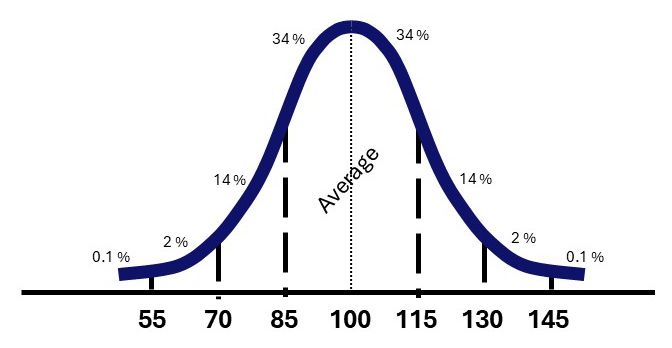CI Opportunity Assessment
Results Interpretation
As you read through the comments or watch our videos, keep in mind we offer more detailed information and ideas to our CI Jumpstart Program members.
NO CHEATING!
Don't scroll down until you have completed the
CI Opportunity Assessment Workbook.
Review Your Answers
Where do you fall in the intelligence spectrum?
Take a look at the following chart. It shows the actual distribution of IQ.

I intentionally started this workbook with a controversial, emotional question. The idea is that continuous improvement will push you far outside of your comfort zone. But there is an actual reason for asking this specific question.
Most people are somewhat aware of where they fall on the scale. They may have had an IQ test when they were in elementary school or might have taken a test online. There are, however, some people who really don't have a very good idea of where they fall on this scale. If you struggled when trying to determine where you fit, you might be one of those people.
There is also a phenomenon called the Dunning Kruger effect. It basically says that low performing people overestimate their performance, and those at the other end of the scale tend to underestimate how well they did.
So, what does this mean for continuous improvement?
Basically, as you do projects, you need to know where you fit on the scale. If you are on the lower than average side, you will have to rely heavily on the tools to help you prevent you from making mistakes. If you are on the high side, you have to keep your overconfidence in check. Now, that's a little different than I mentioned earlier with the Dunning Kruger effect. That is how well you actually performed. Smarter people often take on challenges without doing the basic work. Essentially that means they use gut feel more than facts and data. That’s frowned upon in continuous improvement.
Having a strong continuous improvement system in place helps people all along the scale manage their shortcomings while capitalizing on their strengths. And keep in mind that intelligence is only one of many factors that goes into success. The smartest person in the world won't be successful if they don't take action.
How much formal continuous improvement training do you have (all time)?
In this context, formal can be any sort of training that you
received in some sort of structured program. This might be a class you took at
a university, an online course, or even a day of training before a kaizen
event.
The point of this question is to assess how committed you
have been towards continuous improvement. If you are brand new to continuous
improvement, then there would not be much expectation for having previously
taken courses. If, however, you have been doing continuous improvement in your
company for a much longer, you should question whether or not you are committed
to getting better at it if you are on the low side of these training options.
While it was not part of the question, you should also
consider whether you were self motivated to take the training or whether you
were directed to do so. You'll find that you are much more successful if you
internalize desire to get better.
How
much informal continuous improvement learning have you done in the last 6
months?
The point of this question is very similar to the previous one. I want you to look at your motivation to learn. I want you to think about how curious you are about the topics of continuous improvement and how vested you are in making sure that you are implementing them correctly.
Again, if you are brand new to CI, you probably won't have a lot of history in online research. But if you have spent the last few years in a company that has a continuous improvement program, especially if you are in a leadership role, you should be asking yourself why you haven't been consuming more continuous improvement knowledge.
I'd also like you to consider, if you have been doing a lot of online research, how difficult it can be to find exactly what you're looking for. There is so much out there, it can be hard to parse through it and figure out what is accurate and what is not. It is also sometimes difficult to learn when there is an eclectic batch of content that doesn't mesh together well.
The nice thing about our system is that it provides both formal and informal training. If you have a specific question about a term, you'd be hard pressed to find a more extensive reference guide. We have loads of training modules dedicated to nearly all of the major lean concepts that you will encounter. And on top of that, the Continuous Improvement Development System will help you decide what you need to learn.
When was the last improvement project you initiated on your own?
Describe the last improvement project you initiated on your own?
The purpose of these two questions should be fairly obvious.
I want you to think about how self motivated you are about making improvements.
If it has been a very long time since your last effort, you should be asking
why. It could either be something internal where you just don't take projects
on, or it could be that your work environment is not very conducive to you
taking that sort of risk.
Regardless, having a solid system in place makes it more likely that you'll take on projects, which is really a cornerstone of continuous improvement--having people at all levels of the organization committed to making positive change.
Now the character of that project tells another story. If
you are just winging it or if you feel like you're going it alone those are
signs of problems. It either means that you are not following the systems that
are in place in your company or your company does not have systems. Both of
those are fairly significant problems that are addressed in the early phases of
The Continuous Improvement Development System.
Specifically, if you have resource teams that can backfill
for projects, if you have good cross training so you can get help, if you have
resource areas set up with the tools and supplies you will need, it will be
much easier for you to take on projects. On top of that, if you have good stand
up meetings in the morning and decent daily management, you will be flooded
with ideas for improvements and you will be communicating with other people who
may be able to assist.
When was the last time you were a team member on someone else’s project team?
Describe the experience being on their team
This pair of questions is very similar to the previous pair but is more focused on the teamwork aspect and the consistency of projects.
First off, if you have not been on anybody else's project team it is very likely that nobody else has been on your project teams. Continuous improvement is powered by brains, and when you get several complementary brains in the same room you can accomplish amazing things. So the key here is to figure out how well your company is doing at supporting each other.
Secondly, by asking about the nature of the project, I am really helping you think about how good your systems are. If your project leaders are not adept at getting the most out of teams, especially at leaving them enthusiastic about participating on more projects in the future, you have a serious problem on your hands. If different projects within the same company feel dissimilar or are managed to different levels of competence, it is a big indicator that the company-level systems for training leaders are falling short. And there's probably not much set up in the way of support systems for things like kaizen events or other types of projects.
Review Your Answers
Learn new skills
Field experts
We are here to create new possibilities
Online courses
Forward Thinking
Designed with professionals in mind
Ready to give us a try?

Featured links
Connect with us
Jumpstart Your CI Excellence
Get Your Free A3 Template
and a whole lot more!
